There will be limits to how hard you can party in Dunwoody.
The north DeKalb County city is the latest to look into restrictions on party houses — rental homes with the explicit intent of throwing consequence-free events. Dunwoody is following in the footsteps of Atlanta and Sandy Springs by outlawing these raucous gatherings from taking place.
City staff members said party houses haven’t been a widespread problem in Dunwoody, unlike Atlanta and Sandy Springs where they became prevalent following the COVID-19 shutdown last year. City officials have battled with how to rein in these house parties, which attract hundreds of paying attendees.
Dunwoody leaders said they want to shut down the potential for raging, noisy parties disturbing suburban neighborhoods.
“This is a preemptive measure to make sure that (party houses) don’t get pushed further outwards into Dunwoody,” Madalyn Smith, senior planner for Dunwoody, said during a Tuesday planning commission meeting.
The planning commission doesn’t pass policy, but it does make recommendations to the City Council. The commission unanimously voted to endorse an ordinance that updates the city code to prevent party houses from existing within 150 feet of other residential properties. The city defines a party house as a residential home that’s available for rent, typically through a service like Airbnb, specifically for the purposes of large, commercial-type gatherings.
The ordinance does allow for residents to apply for a special administrative permit to throw such a party, but it’s unlikely there’s a property in the city that would meet the criteria for approval. The city’s community development director will review permit applications.
The director is supposed to deny applications if the home is within 150 feet of residential areas, if the noise generated by the event will likely violate the city’s noise ordinance and whether the event could endanger public health among other criteria. If approved, the permit will expire after 48 hours, and it can’t be immediately renewed.
The city can seek legal damages in court or revoke a permit if the property owner violates the new ordinance. The City Council will consider the ordinance at an upcoming meeting.
About the Author
Keep Reading
The Latest
Featured


